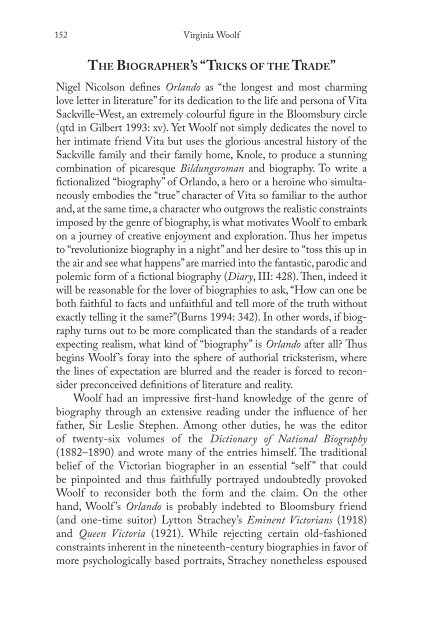Blooms Literary Themes - THE TRICKSTER.pdf - ymerleksi - home
Blooms Literary Themes - THE TRICKSTER.pdf - ymerleksi - home
Blooms Literary Themes - THE TRICKSTER.pdf - ymerleksi - home
Create successful ePaper yourself
Turn your PDF publications into a flip-book with our unique Google optimized e-Paper software.
152<br />
Virginia Woolf<br />
the Biographer’s “triCks of the trade”<br />
Nigel Nicolson defines Orlando as “the longest and most charming<br />
love letter in literature” for its dedication to the life and persona of Vita<br />
Sackville-West, an extremely colourful figure in the <strong>Blooms</strong>bury circle<br />
(qtd in Gilbert 1993: xv). Yet Woolf not simply dedicates the novel to<br />
her intimate friend Vita but uses the glorious ancestral history of the<br />
Sackville family and their family <strong>home</strong>, Knole, to produce a stunning<br />
combination of picaresque Bildungsroman and biography. To write a<br />
fictionalized “biography” of Orlando, a hero or a heroine who simultaneously<br />
embodies the “true” character of Vita so familiar to the author<br />
and, at the same time, a character who outgrows the realistic constraints<br />
imposed by the genre of biography, is what motivates Woolf to embark<br />
on a journey of creative enjoyment and exploration. Thus her impetus<br />
to “revolutionize biography in a night” and her desire to “toss this up in<br />
the air and see what happens” are married into the fantastic, parodic and<br />
polemic form of a fictional biography (Diary, III: 428). Then, indeed it<br />
will be reasonable for the lover of biographies to ask, “How can one be<br />
both faithful to facts and unfaithful and tell more of the truth without<br />
exactly telling it the same?”(Burns 1994: 342). In other words, if biography<br />
turns out to be more complicated than the standards of a reader<br />
expecting realism, what kind of “biography” is Orlando after all? Thus<br />
begins Woolf ’s foray into the sphere of authorial tricksterism, where<br />
the lines of expectation are blurred and the reader is forced to reconsider<br />
preconceived definitions of literature and reality.<br />
Woolf had an impressive first-hand knowledge of the genre of<br />
biography through an extensive reading under the influence of her<br />
father, Sir Leslie Stephen. Among other duties, he was the editor<br />
of twenty-six volumes of the Dictionary of National Biography<br />
(1882–1890) and wrote many of the entries himself. The traditional<br />
belief of the Victorian biographer in an essential “self ” that could<br />
be pinpointed and thus faithfully portrayed undoubtedly provoked<br />
Woolf to reconsider both the form and the claim. On the other<br />
hand, Woolf ’s Orlando is probably indebted to <strong>Blooms</strong>bury friend<br />
(and one-time suitor) Lytton Strachey’s Eminent Victorians (1918)<br />
and Queen Victoria (1921). While rejecting certain old-fashioned<br />
constraints inherent in the nineteenth-century biographies in favor of<br />
more psychologically based portraits, Strachey nonetheless espoused

















